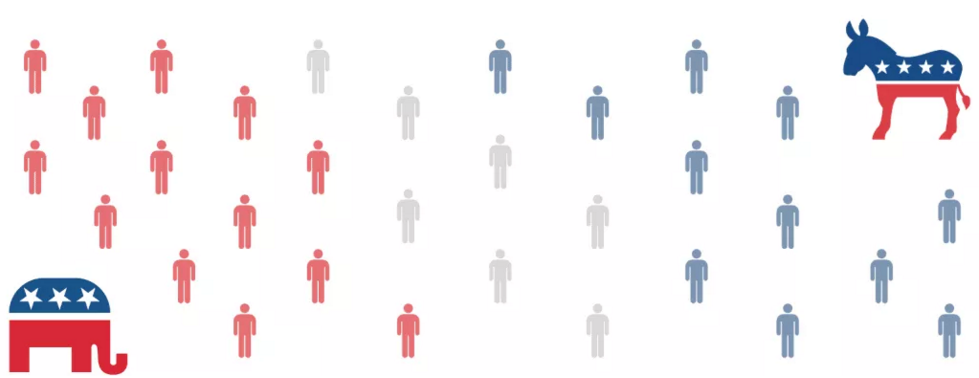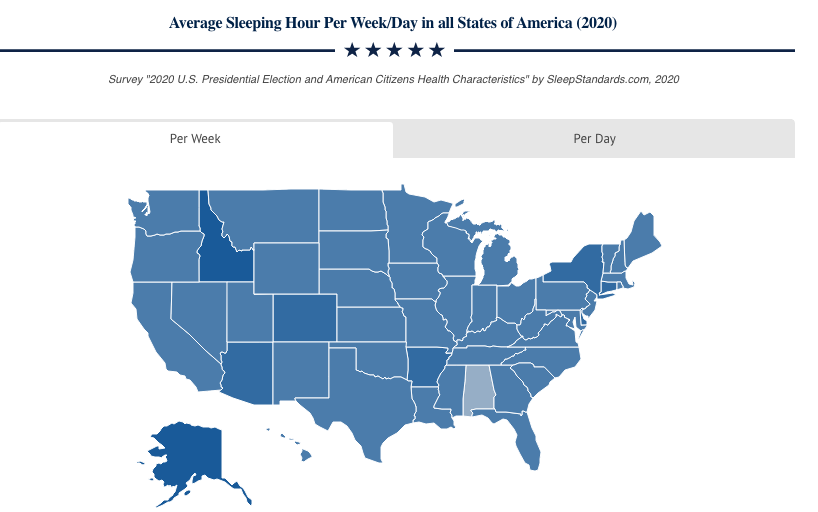2020 U.S. Presidential Election and American Citizens Health Characteristics

The upcoming U.S. Presidential Election is highly anticipated by many across the globe. However, with the onset of COVID-19 and the rise of the Black Lives Matter movement, America has been hit with many different problems all at once. We decided to take a survey to see how these events are impacting the health of American citizens. Let’s take a look at the results! START HERE
United States Presidential Election, 2020
These are unprecedented times in America, the U.S. climate is incredibly unstable, and the divide between the left and right has never been higher than before. There simply seems to be no point of agreement with republicans and democrats. In these dark and unstable times, the problem is exacerbated by a lack of leadership. When in the past, during these uncertain times, the president was a figure that would unite the people; these modern times are a far cry. Donald Trump continues to divide during his presidency and exacerbates the already contrasting opinions.
Additionally, with the entire world hit by the COVID-19 pandemic, the economy has virtually shut down. Cracks are beginning to show in the healthcare system as well, as individual cities become overburdened. Under these already gloomy circumstances, the murder of George Floyd at the hands of a police officer sparked the country into protesting and rioting. The Black Lives Matter movement has taken to streets, and protestors currently occupy an entire zone in Seattle. All these conditions combine to create a uniquely stressful political climate within the country. With the upcoming 2020 elections, it’s prudent that we manage to get an idea of American citizens’ health.
I. Survey Demographics
Who Took The Survey
The survey we conducted involved 1137 Americans from all over the country. Table 1 indicates the overall gender division among survey respondents. The voters consist of 553 male, 580 female, and 3 other respondents.
Additionally, a wide variety of the respondents align with Democrats, representing a 43.40% majority. Republicans represent 26.90% of all respondents, while 27% support independent candidates; the full results are available in Table 2. Both Table 1 and Table 2 represent the demographics of the survey.


II. Survey Results
Our survey results have been divided into five different categories. Each category represents a distinct reflection of the health of American citizens. This categorization helps us quickly understand the condition of the various states in countries and the participating respondents.
Sleeping Habits
Sleeping habits are an essential variable when it comes to measuring the overall health of citizens. In the short run, poor sleeping habits lead to fatigue, a short temper, and a lack of focus. While an occasional night without sleep won’t have a significant impact on your health, a continuous lack of sleep will fog your brain. As a result, it’ll make concentration difficult, and your decision making also comes under question. It also puts you at a significantly higher risk of suffering from an accident. Therefore, it makes it crucial that we got an idea about the sleeping habits of our correspondents.
The state with the highest average hours of sleep per week is Alaska, with a time of 44.1 hours, while the lowest average hours of sleep per week belong to Alabama at 41 hours. These results also make sense when you look into a study that analyzed stress levels in different states. The study revealed that Alabama was the most stressed-out state in the country, and the lowest average hours of sleep per week continue to support that result.
When you look at Alaska, the results make sense as well. While it remains a part of the United States, the state is cut off from the rest of the country. It’s a large remote area, with tons of wilderness that provides a significant contrast from the sprawling urban infrastructure in other states.
Other states fall in between the range of 43 average hours of sleep per work. Every state falls slightly below the recommended 47 hours of weekly sleep that the average adult should get. The results for the daily statistics wholly represent the weekly statistics. Alabama is the state that comes up with the lowest average hours of sleep per day with a time of 5.94 hours, and Alaska again reports the highest numbers of average hours of sleep per day with 6.3 hours.
Average Sleeping Hour Per Week/Day in all States




The results help showcase the discrepancy between stress levels in the states. Additionally, each state also falls below the recommended 7-9 hours of sleep per day. It’s an indication of the currently elevated levels of stress in the country due to all the political turmoil. Experts also indicate that the level of sleep deprivation is going to increase. Matt Walker tweeted that there’s a 15% increase in people sleeping less than 6 hours a night in the U.S. Furthermore, in another tweet, he stated that a vast majority of these individuals getting less than 6 hours of sleep every night were a part of medical services or the military. The prevailing opinion on the matter is that the increasing levels of sleep deprivation eventually catch up to society.
Alaska has the highest average hours of sleep per week with a time of 44.1 hours.
Alabama has the lowest average hours of sleep per week with a time of 41 hours.
The average hours of sleep per day in all U.S. states falls below the recommended 7-9 hours.
The average hours of weekly sleep in United States is 43.3254187 which falls slightly below the recommended 47 hours of weekly sleep that the average adult should get.
Expert Opinion:
Matt Walker – Professor of Neuroscience at UC Berkeley; Author sleepdiplomat.com
A 15% increase in people sleeping less than 6 hours a night in the US, relative to 2004.
Matt Walker Tweet
Health Issues
Additionally, it’s pertinent to ask respondents of the survey regarding their current health issues. COVID-19 has infected more than 2 million Americans, and more than 100,000 have lost their lives to the virus. Recent riots and protests have also resulted in several injuries to citizens, in clashes with the police. These political circumstances have a significant impact on citizens’ health. When respondents were asked about the health issues they were facing, their response is available in the figure below:
Traumatic injury
3.3%
Stress disorder
24.3%
Anxiety
52.4%
Sleep deprivation
16.2%
Insomnia
16.2%
Tired/ Drained/ Nauseous
41.8%
No effects
2.5%
The results from the figure indicate that 52.40% of survey respondents are experiencing anxiety at the time, which puts them in a heightened stress level and fear. A whopping 41.80% of participants report feeling tired/drained/nauseous. Moreover, 16.2% of the respondents said that they had insomnia or sleep deprivation. While stress disorder was accounted for by 24.30% of the participants, this wide variety of health issues are going to have an impact on voter decision making during election day. Only a tiny minority of 2.50% report that they are feeling no health issues during this current time, and 3.30% say that they suffered from a traumatic injury during this time.
52.40% (596) of Americans claimed that they are experiencing anxiety during the President Election and political events.
41.80% (475) of Americans reported that they experienced tired/drained/nauseous.
16.20% of the respondents said that they had insomnia/sleep deprivation.
54.8% of Americans confirmed that they experienced stress disorder.
Impact Of Recent Political Events
It’s safe to theorize that recent political events have had a significant negative impact on American citizens’ lives. We asked our survey respondents regarding the matters, and the bar chart below illustrates the results.
Eating unhealthy/ Don’t want to eat
50.3%
Drinking alcohol
24.8%
Smoking
15.8%
Arguing
26.6%
Fighting
7.6%
Having less sex
17.9%
No effects
1.8%
When asked how the Presidential Election, George Floyd protests, and Covid-19 Pandemic negatively affect your life? A massive 50.30% of respondents stated that they were having trouble eating or eating unhealthily. Additionally, 24.80% of respondents indicated that they were drinking alcohol to cope with the events. These results tie in with 52.40% of respondents reporting that they’re feeling anxiety at this time.
Moreover, 26.60% of respondents reveal that they’re arguing more during these times, and 17.90% report having less sex. These results are attributable to the fact that 24.30% of respondents experienced stress disorder, and 16.20% of respondents were suffering from sleep deprivation. Lockdown restrictions and the current Black Lives Matter protest are also heavily debated subjects. Naturally, the upcoming presidential election is a matter of considerable debate. It doesn’t help that the divide between the right and left has never been more substantial.
50.30% of respondents stated that they were having trouble eating or eating unhealthily.
24.80% of respondents indicated that they were drinking alcohol to cope with the events.
26.60% of respondents reveal that they are arguing more during these times.
17.90% of respondents have admitted to have less sex during the events.
Current Stressors
While all these recent events have a significant impact on American citizens’ health, it’s important to differentiate what factors are causing the most significant amount of stress. To get an idea of what seems to be the most significant cause of the health issues, we asked respondents which factors they believe contributed to their deteriorating health.
The results from the survey question reveal that the contributing factors were evenly spread out. Concern about America’s future and the next president was the highest contributing factor, with 46.2% of survey participants claiming it affects their health. With an upcoming presidential election, this kind of concern is natural. However, it’s been dramatically exacerbated by Donald Trump’s controversial presidency.
The second-largest contributing factor among respondents was the fear of losing jobs in the Covid-19 crisis. These fears are genuine, with the lockdown restrictions causing several businesses to go under. A massive number of Americans have already lost their jobs, and more will likely follow in the future. Robert Reich is currently campaigning on twitter to ask the Senate to extend unemployment benefits immediately. The expanded unemployment benefits expire from July 31. As a result, 21 million unemployed Americans will have to face a 60% income reduction.
Additionally, the recent rioting and protests have led to growing concerns for family safety in the country. It’s reflected by 39.40% of the respondents voting that worrying about family safety was contributing to their health issues. Increasing evidence of police brutality during these protests is also a key indicator of why these fears are growing. Another primary concern because of the recent protests is the possible expansion in Covid-19 cases, with 37.60% of respondents reporting that the fear is contributing to their health issues. Despite recent reports by media outlets suggesting that the protests aren’t the cause for the spike in coronavirus cases, many individuals doubt this to be the case. Ari Fleischer called out the Washington Post when they attributed bars, parties, and a Trump rally to the spike in coronavirus cases.
35% of participants also report that the rioting and looting that ensued after the murder of George Floyd was contributing to their health issues. Vandalism has been on the rise, with individuals looking to vent their frustrations out. As a result, Americans have feared for the health of national monuments and their cities. The department of justice recently charged four people that were attempting to destroy a national monument. Donald Trump Jr. recently praised the action in a tweet. While peaceful protests are the right of every American citizen, rioting and looting is a crime that shouldn’t go unpunishable.
46.20% of Americans concerned about America’s future on the next presidential term.
37.60% of Americans concerned about the expansion of the Coronavirus from George Floyd protests.
36.00% of Americans concerned about the impact of George Floyd protests when looting and violence happened.
27.80% of Americans concerned about the U.S. viral fake news on magazines/social media.
42.40% of Americans concerned about losing jobs in Covid-19 crisis.
39.40% of Americans concerned about family safety.
Expert Opinion:
Ari Fleischer – Former WH Press Secretary. FOX News contributor fleischercommunications.com
“Is it Memorial Day? Is it the George Floyd demonstrations? Is it going to the beach?” “We don’t really know,” he shrugged, “but it is probably all of those things that are contributing.” That’s a rational conclusion.”
The Protests and the Surge”Ari Fleischer Tweet
Donald Trump Jr. – EVP of Development & Acquisitions The @Trump Organization donjr.com
Good!!!
Dept of Justice charged four people who attempted to destroy a national monument?
Domestic Terrorism should never be tolerated! Proud of @realDonaldTrump for taking decisive action!Donald Trump Jr. Tweet
Robert Reich – Berkeley Professor, frmr Sec of Labor. Cofounder, Inequality Media
Good!!!
Dept of Justice charged four people who attempted to destroy a national monument?
Domestic Terrorism should never be tolerated! Proud of @realDonaldTrump for taking decisive action!Robert Reich Tweet
Current Stressors
Lastly, we rounded up the survey to understand the voting preference of the respondents. Given that most of the survey respondents were Democrats, it was natural that the results would showcase the same preferences. As a result, 44.70% of respondents state they would vote for Joe Biden, while 33.60% state they would vote for Donald Trump.
When asked about what factors that the chosen candidate can solve to make America Better, Biden wins in almost all categories. These include Infrastructure, Taxes, Healthcare, Jobs and Wages, Climate Change, Student Debt, Racial and Social, and Class Size. Jobs and Wages seem to be the primary concern after the ongoing pandemic, and the results are interesting. Despite the disparity in voter preference, only 26% seem to think that Biden is the better-suited candidate for providing more Jobs and Wages, and 22% of respondents believe that Trump is better for Jobs and Wages.
According to Richard D. Wolff, the best plan would be to hire workers to make workplaces safe to reopen again. This would help get the economy back running and would result in hiring more workers. The Democratic candidates also seem keen on extending the emergency Covid-19 provision, as is stated in a tweet by Ro Khanna.
When asked about what factors that the chosen candidate can solve to make America Better, Biden wins in almost all categories. These include Infrastructure, Taxes, Healthcare, Jobs and Wages, Climate Change, Student Debt, Racial and Social, and Class Size.SleepStandards.com
Expert Opinion:
Richard D. Wolff – Host of #EconomicUpdate, Prof. of Economics Emeritus @UMassAmherst, visiting Prof. @TheNewSchool, founder @democracyatwrk
“Reopen economy” = risk your life or lose your job. The choice capitalism offers.
Better plan: In a national emergency, gov’t hires the 30 million jobless to make workplaces safe to reopen. Hires can be funded by 100% tax on all personal wealth above $100 million.Richard D. Wolff Tweet
III. Methodology And Limitations
To collect the data shown above, we surveyed 1137 respondents in the United States on how the Presidential Election and the recent political events have had a significant impact on the health of American Citizens. An attention-checker question was included to ensure the participants did not mindlessly answer questions.
Because the survey relies on self-reporting, issues such as telescoping and exaggeration can influence responses. Please also note that this survey’s results do not reflect our opinions.
IV. Fair Use Statement
If you know someone who could benefit from our findings, feel free to share this project with them. The graphics and content are available for noncommercial reuse. All we ask is that you link back to this page so that readers get all the necessary information and our contributors receive proper credit.Back to top
Related Articles


What Is The Best Nap Length? Optimal Nap Time Revealed


Sleep Hygiene: The Ultimate Checklist For A Better Night’s Sleep


What Is Insomnia?
FacebookTwitterInstagramPinterest


NAVIGATION
ARTICLE TOPICS
SleepStandards is a participant in the Amazon Services LLC Associates Program, an affiliate advertising program designed to provide a means for sites to earn advertising fees by advertising and linking to Amazon. Additionally, SleepStandards participates in various other affiliate programs, and we sometimes get a commission through purchases made through our links.
The information and other content provided in this blog, or in any linked materials, are not intended and should not be construed as medical advice, nor is the information a substitute for professional medical expertise or treatment.
© 2020 Sleep Standards | All Rights Reserved
For more on this article and video go to: SLEEP STANDARDS





